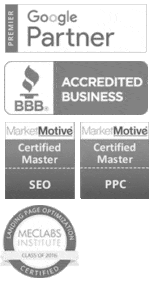Getting started in SEO
Q: Why did you decide to go into SEO?
A: At first, I had only a passing interest in it. I’d heard about it, then looked into it to see if I could rank a site for certain things and found it fascinating. I started studying it in my time off by reading trade journals and blogs, and saw the mystery beginning to unfold. Then I realized how much I enjoyed it and that it was becoming a passion that I could follow.
Q: Once you began to dig in to SEO, did it match your expectations or were there surprises?
A: I was surprised by how technical it was, and thought that might be why more web designers and developers were getting into it before marketing people were. I’m not a tech guy from, say, a programmer standpoint, but I enjoy that side of it.
Q: What would you tell someone who’s thinking about getting into the SEO business?
A: You need to bring several different things to the table to be successful. An interest and proficiency in the technical side is a must, and that one factor can separate the good SEOs from the bad. Right next to that is an understanding of business and of marketing, which are closely tied together. Overall, it’s a mix that’s hard to find, but if you’re going to be good at this, you need all of these elements. If you don’t personally have all of these skills, find great people to work with you who do.
Q: In the two years since you started DAGMAR Marketing, how has the industry changed? Was there a different focus in the beginning?
A: Starting out, it was more about achieving rankings and just making sure whatever content was already there was optimized for search engines. Those are still factors, of course, but because of the constant changes the search engines make to the algorithms to reduce spam and increase the quality of search results for users, the focus has changed. What matters now are what’s always mattered in marketing and advertising: solid creative concepts, good networking with others, getting a presence on well-read sites and high-quality, original content. Together, these generate the best SEO signals, but they also raise the bar for everyone. I think it’s good, because the “black hat” SEOs who’ve had a negative effect on the perceived value of SEO are finding it harder to stay in business, and “white hat” SEOs are incorporating more services into the mix for a more valuable offering to their clients.
Q: What do you like most about SEO?
A: The fact that not everyone can do it well and that the need to have it in a marketing strategy has really grown. I also enjoy the competition — seeing what competitors are doing and knowing I have to beat them for our clients. That’s a “perfect storm” for me.
Q: What do you find most challenging about it?
A: It’s the constant change. You think you know all there is to know about SEO, and then a couple of months go by and your knowledge is already out of date. Providing the day-to-day services for clients takes up all of your time, but you have to find the time to keep up with the changes to maintain the value you’re delivering to those clients.
Working with an SEO provider
Q: Where should small business owners start if they’re just becoming aware of the need for SEO?
A: Start with a good website. Most small business owners underestimate the value of their site, or even see it as a necessary evil, and start with a template that’s not geared for marketing their companies. They invest in a brochure site, then it’s quickly outdated, and then they’re frustrated. A good site goes beyond visual design — it should be easy for them to add content to it, easily optimized and should be able to grow with their businesses. In any case, no site should be launched today without considering SEO. We’re well beyond that time, that was years ago.
Q: What can a business owner do to prepare to start working with an SEO consultant or agency?
A: They have to identify who’s good in SEO. Sometimes, because they’re on a limited budget, they go with lower-priced services and end up with a lot of bad links, bad content and bad advice. That results in the thinking that SEO doesn’t work. So by the time they come to DAGMAR, some of them have a bad taste for SEO but know they still need it. We may have to undo some of that and it can take longer to get good results for them. So before a business owner takes on a relationship with any SEO service, he or she should try to find referrals from other businesses that are experiencing the gains that a great SEO consultant can bring them.
Q: What can a new DAGMAR Marketing client expect when they first come on board?
A: The first thing that happens is an inventory of all of the variables that go into an SEO campaign. We look at the site, look to see if we can work with it or what needs to change. We look at the main keywords in their field — not just the ones the client suggests, but those that have more traffic.
Next up is a competitive analysis to see which keywords we can actually rank for. So the entire first month is spent doing research, assessing strengths and weaknesses, seeing where the opportunities are. Then we establish a baseline for reporting, so the client can see the improvements over time. This is an important point when working with an SEO firm — not all of them offer regular reports that let clients gauge progress and success of their SEO campaign.
From there, we have a solid foundation for an initial strategy. If we get that wrong, though, we may lose two or three months in having to start over. So we really need to get it right in that first month. Right after that first month, we focus on implementing the campaign, optimizing the site and monitoring everything to make sure we’re off on the right path.
Q: What about the longer-term? What kind of ongoing work is done?
A: There are probably a lot of good answers to that, but we’ve been doing this long enough to boil that down to two things: creating more content and generating more links. Either we’re going out getting links, or the client’s content is being marketed in order to get links. Social signals are important as well, but if you get the first two right, social will naturally follow.
Q: How does SEO fit into a client’s overall marketing plan?
A: Without being biased, I’d say it should be at least half of their marketing budget depending on what kind of business they’re in. At a minimum, 50 percent of their budget should be spent in the digital marketing environment, which should include SEO. We are past the point of “trying” SEO. It should be a part of just about every company’s marketing plan.
Local SEO, recommended resources and a look ahead
Q: What about local SEO? Do you think it will eclipse more general SEO strategies for small businesses?
A: Local SEO has really been coming on strong over the last year or so. Now we’re seeing national companies with branches or retail outposts around the country starting to realize they need local-specific SEO. It’s a big challenge for businesses with multiple locations and to do it really well, they need local signals on Facebook, Twitter or Google Places. The challenge is managing all of these local profiles while maintaining control of the corporate brand. We’ll see more of this.
Q: What about national companies that don’t have local branches — is there an angle on local SEO for them?
A: Not in the traditional sense of SEO. If you don’t have a local presence, you’re not “entitled” in Google’s eyes to have a place on the search pages that return a local result. You can still compete organically, but that’s going to be a challenge without a local address.
Q: Who do you follow in the SEO world? Any blogs or experts you’d recommend as good sources of information?
A: There’s no handbook and there’s a lot of bad info, so you have to read between the lines, especially with bloggers. Good resources for me are SearchEngineLand, Search Engine Journal and SEOMoz. On the local scene, I like Linda Buquet’s Catalyst eMarketing’s local search forum and Mike Blumenthal’s blog.
Q: Let’s wrap up with a look at the future. Where do you see SEO headed?
A: I see it becoming established on par with a PR department in an ad agency. It’s part of a much bigger process. I don’t see SEO as a standalone business staying viable. It will evolve as one of the services offered by more full-service providers. If you’re going to try to grow a business that provides SEO, you can’t do it on SEO alone. It surprises me that so many traditional advertising agencies don’t have SEO departments. If you’re not focused on digital marketing, you’re not seeing the future.
Mary McDonald
Latest posts by Mary McDonald (see all)
- Free Local SEO Tools & Resources for Small Business - January 19, 2021
- 2020 Blog Post Roundup - December 21, 2020
- Pest Control Marketing: Content Ideas for Your Blog - November 30, 2020


Leave a Reply